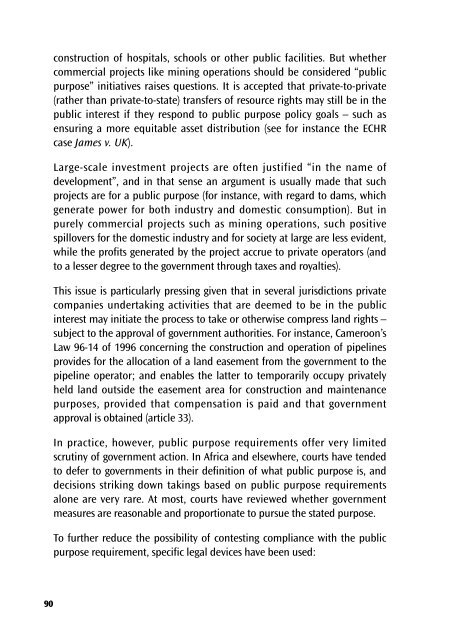Legal empowerment for local resource control
Legal empowerment for local resource control
Legal empowerment for local resource control
Create successful ePaper yourself
Turn your PDF publications into a flip-book with our unique Google optimized e-Paper software.
90<br />
construction of hospitals, schools or other public facilities. But whether<br />
commercial projects like mining operations should be considered “public<br />
purpose” initiatives raises questions. It is accepted that private-to-private<br />
(rather than private-to-state) transfers of <strong>resource</strong> rights may still be in the<br />
public interest if they respond to public purpose policy goals – such as<br />
ensuring a more equitable asset distribution (see <strong>for</strong> instance the ECHR<br />
case James v. UK).<br />
Large-scale investment projects are often justified “in the name of<br />
development”, and in that sense an argument is usually made that such<br />
projects are <strong>for</strong> a public purpose (<strong>for</strong> instance, with regard to dams, which<br />
generate power <strong>for</strong> both industry and domestic consumption). But in<br />
purely commercial projects such as mining operations, such positive<br />
spillovers <strong>for</strong> the domestic industry and <strong>for</strong> society at large are less evident,<br />
while the profits generated by the project accrue to private operators (and<br />
to a lesser degree to the government through taxes and royalties).<br />
This issue is particularly pressing given that in several jurisdictions private<br />
companies undertaking activities that are deemed to be in the public<br />
interest may initiate the process to take or otherwise compress land rights –<br />
subject to the approval of government authorities. For instance, Cameroon’s<br />
Law 96-14 of 1996 concerning the construction and operation of pipelines<br />
provides <strong>for</strong> the allocation of a land easement from the government to the<br />
pipeline operator; and enables the latter to temporarily occupy privately<br />
held land outside the easement area <strong>for</strong> construction and maintenance<br />
purposes, provided that compensation is paid and that government<br />
approval is obtained (article 33).<br />
In practice, however, public purpose requirements offer very limited<br />
scrutiny of government action. In Africa and elsewhere, courts have tended<br />
to defer to governments in their definition of what public purpose is, and<br />
decisions striking down takings based on public purpose requirements<br />
alone are very rare. At most, courts have reviewed whether government<br />
measures are reasonable and proportionate to pursue the stated purpose.<br />
To further reduce the possibility of contesting compliance with the public<br />
purpose requirement, specific legal devices have been used:

















